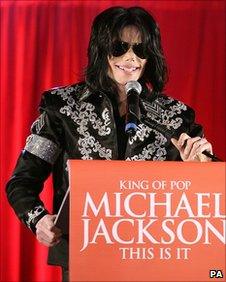Jackson: Life after death?
- Published
Michael Jackson fans may be donning their black armbands and gathering to mark the anniversary of his death - but his estate's accountants could be counting up stacks of cash.

The singer died soon after announcing his 50-date This Is It tour
Earlier this week, Billboard magazine estimated Jackson had earned $1bn (£665m) in the year since his death through record and film sales, ringtones and publishing.
Even his ill-fated This Is It tour generated an estimated $6.5m in ticket sales. Despite the tour not going ahead, many fans opted to keep their ticket as a souvenir rather than get a refund.
But it seems his death did not spell the final curtain for the 'King of Pop'.
Since then the Jackson machine has rolled on with experts now touting the possibility that his next number one spot could be the top earning dead celebrity.
Way forward
"To date, Michael Jackson's executors have been both aggressive and savvy," said Lacey Rose, staff writer at Forbes.
"Among the recent deals they've struck: a 10 album deal with Sony, a multi-show deal with Cirque du Soleil and a videogame deal with Ubisoft," she adds.
Add to that the This Is It documentary - which became the number one concert movie in history, grossing $72m - and the 31.5m albums sold since his death it seems his fans really never can say goodbye.
But to ensure the entertainer's name continues its run of good fortune, executors will have to keep a tight rein on his image and a close eye on anyone else who tries to slap his face on so much as a mug.
Lots of famous names in fashion fail to follow this advice, says Interbrand London chairman Rita Clifton.
She cites the example of Pierre Cardin, who after establishing a reputation as a luxury designer failed to make the most of his long-term premium value by allowing the brand to be exploited down the fashion chain - as low down as "tacky ties and lighters".
"The onus will be on the executors of Jackson's estate to keep the late king of pop's image and music relevant," adds Forbes's Ms Rose.
"His executors will need to be savvy with the types of deals they strike. It will become increasingly important to keep his face and product out there connecting with fans. Having a Cirque du Soleil show both on the road and based in Las Vegas is a logical and likely lucrative way of doing just that."
Timeless?
Mark Roesler, chief executive and founder of CMG Worldwide, which represents the estates of famous people including James Dean and Marilyn Monroe, agrees that maintaining the integrity of a celebrity is key.
"We want to make sure the image we put out will ensure a long and timeless legacy. For example, with our client Ginger Rogers, as per her estate's request, we would not approve any photos related to alcohol or violence," he says.
But it is not just after death that brand value needs careful attention.
Celebrities or sportsmen whose careers are coming to an end need to know how to keep their brand alive.
She cites the example of tennis player David Lloyd - "not a top ranking tennis player nor as good looking as his brother John," as she puts it.
But he was canny enough to diversify out of tennis and into fitness centres, broadening his brand to sustain its value; a very distinct strategy to that of Bjorn Borg who even put his name to a range of underwear.
"At one time he was a sexy, glamorous, blond tennis player. As he wasn't preserved in time in that way not a lot of products have been attached to him, I'm afraid his fortune has wound down."
Meanwhile, Mr Roesler warns celebrities that they should consider their earning potential post mortem - which for many was higher after their death.
"Iconic celebrities should start thinking about building their brand now. Their brand is no different than a Coke, Mickey Mouse or McDonalds. The death of the creators of those brands had very little impact on the ability of the brand to sustain itself," he says.
"Michael Jackson ... may have died one year ago and we are still talking about how much more he is worth today. We can look ahead a couple of generations, and we will continue to have the same discussion about him."
Turnaround
In fact, death may actually have given a new lease of life to Jackson's career, suggests Ms Clifton.
Rather than being known for the less savoury aspects of his life, his star was already on the way back up when he died.

Could Jackson's Neverland become a 'museum' similar to Elvis's Graceland?
"His estate was clever, they re-released his music and videos and it brought it back for a new generation who then realised how amazing he was. This was new for them as they had thought he was weird - his changed skin colour, the child abuse case - his music was almost a side show.
"Then people suddenly realised how extraordinary he was in his heyday; and if the estate can keep that legacy in people's minds there's no reason why he won't continue to generate value like the image of Marilyn Monroe."
Jackson's revamp into a posthumous money-making machine is even more stark when compared to the financial woes he faced while he was alive. The Wall Street Journal estimated his debts at $500m.
"Michael Jackson had amassed fame and squandered fortune like no other entertainer in history," Ms Rose added.
"What you had was a millionaire spending like a billionaire. The result: he is worth more dead than he was alive in his later free-spending years."
- Published25 June 2010
- Published22 June 2010
- Published21 June 2010